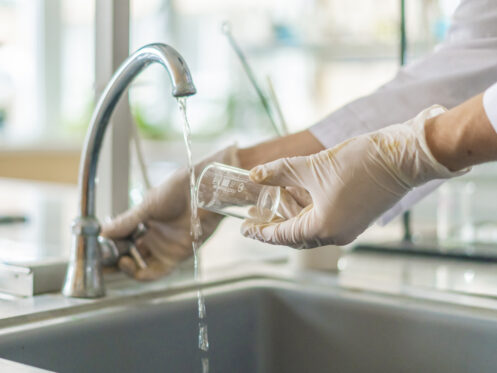If you have hard water in your Indianapolis, IN home, it’s important to do something about it. Hard water buildups can shorten the lifespan of your appliances, and they can also diminish the appearance of your plumbing fixtures, undermine the integrity of your pipes, and reduce your water pressure. Before installing water-softening equipment, you should consider some of the most frequently asked questions about these home additions, their benefits, and their drawbacks.
What’s the Difference Between Hard Water and Soft Water?
Hard water is water with high concentrations of calcium, magnesium, and other minerals like zinc, iron, or manganese. When groundwater moves through rock or percolates through deposits of gypsum or chalk, it dissolves and collects these minerals along the way. Although many of the minerals in hard water are necessary to ensure the human body thrives, the way in which they’re present in hard water is hardly beneficial. In this form, these minerals cannot be absorbed.
In addition to extracting or minimizing concentrations of harmful chemicals, municipal water treatment systems eliminate dangerous waterborne pathogens like giardia lamblia and legionella through the application of chlorine, chloramine, and other sanitizing agents. However, municipal water treatment does not adjust hard water mineral concentrations. The goal of municipal water treatment is to ensure that local water supplies are safe for consumption.
Having hard water in your home doesn’t mean that your water isn’t drinkable or acceptable for cooking and bathing. However, it does mean that your pipes, appliances, and fixtures will gradually develop mineral deposits. Hard water is a constant contributor to expedited wear and tear on all water-reliant appliances and plumbing fixtures. Hard water can also have a significant impact on skin and hair health.
Soft water is hard water that’s been treated by whole-house water-softening equipment. Water-softening systems limit the concentrations of hard water minerals across all water supply lines and taps. Although it’s possible to detect hard water problems by checking for mineral build-ups or assessing changes in the health of your skin and hair, the only sure way to determine your water’s hardness is by scheduling water testing services.
Are Water Softeners the Same as Water Filters?
Whole-house water-softening equipment and whole-house water filters are not the same. Water softeners remove hard water minerals while water filters do not. Water filters eliminate chemical contaminants and water treatment agents, such as chlorine, chloramine, and fluoride. If you have hard water, a water filter might improve the taste and smell of what comes out of your taps while providing a generous range of health benefits. However, it won’t protect your fixtures and appliances or provide improvements in the health of your skin and hair.
It’s also important to note that installing a water filtration system in a home with excessively hard water can lead to early equipment failure. Just as buildups of hard water minerals shorten the lifespans of plumbing fixtures and appliances, they can also shorten the lifespans of water filters.
How Does Residential Water Softening Equipment Work?
Often referred to as ion exchange units, residential water softeners attract calcium and magnesium using resin beads. Once completely saturated by magnesium and calcium, these beads are cleaned by highly concentrated saltwater solutions of combined sodium and potassium. The resulting chloride is then passed out of homes via their wastewater systems.
How Can a Water Softener Improve My Health?
When it comes to improving the health of homeowners and their families, water-softening systems come with both benefits and drawbacks. In homes with hard water, having a water softener installed can lead to:
- Softer and healthier skin and hair
- Less skin irritation
- Decreased hair breakage or hair loss
- A lesser reliance on heavy moisturizers or other restorative products
However, getting rid of calcium and magnesium also means consuming and bathing in water that has a significantly higher salt concentration. Although this increased sodium content doesn’t have an adverse impact on most consumers, there are instances in which it may not be the best choice for water improvement.
What Is a Saltless Water Softener?
Saltless water softeners don’t add potassium or sodium to treated water, and they don’t remove hard water minerals. Instead, they soften them or lessen their adhesiveness so that they’re much easier to clean off appliances and fixtures. These systems are the preferred solution in households where increased sodium exposure is a major concern. However, they offer limited effectiveness and only work well when water is only minimally hard.
Does Size Matter?
Like both storage-based and tankless water heaters, water softeners have limited capabilities. They cannot produce an infinite amount of soft water within a certain amount of time. Choosing a unit that’s too small for your home and your household’s needs can cause you to have an insufficient amount of soft water to meet your needs. Conversely, an overly large water softener will use more sodium and electricity than necessary. The best way to avoid sizing issues like these and ensure optimum performance is by having this equipment installed by a licensed plumber.
Can Aging Plumbing Systems Create Hard Water
There’s also the potential of having hard water in your home even though the water routed into your plumbing system is soft. For instance, if your plumbing system was installed before 1975, you have water supply pipes made from zinc-coated, galvanized steel. As water moves through these aging structures, it picks up minerals that wind up being deposited on water heater tank bottoms, showerhead filters, faucet handles, and more. In this instance, buying and installing a water softener isn’t the most cost-effective choice. Replacing outdated pipes will solve your hard water issues without adding sodium to your water supply.
How Can I Know Whether Water Softening Is Right for My Home?
If your water-reliant appliances often need repairs and rarely make it to the ends of their expected lifespans, hard water may be the culprit. You might have excessively hard water if your clothes look dull and faded within a short period or if your faucets regularly have buildups at their foundations or handles. Water spots on your glasses and flatware are another indication of hard water issues.
However, some homeowners contend with both hard water and water contamination at once. Fortunately, water quality testing services will give you better insight into the specific minerals and contaminants that are in your water supply. If you’re worried about the short and long-term effects of consuming, cooking with, or bathing in water that contains fluoride, chlorine, or other chemicals, you can have both a water softener and a whole-house water filter installed. With water quality testing, you can also determine whether a standard water softener or a salt-free system is the right choice for your home.
With over 12 years of industry experience, we help residents of Indianapolis, IN make informed decisions about their home water supplies and plumbing systems. We offer water softeners, sump pumps, and water heaters. We also provide leak detection, drain cleaning, and general plumbing services. To schedule an appointment, contact Hope Plumbing, Heating and Cooling today!


